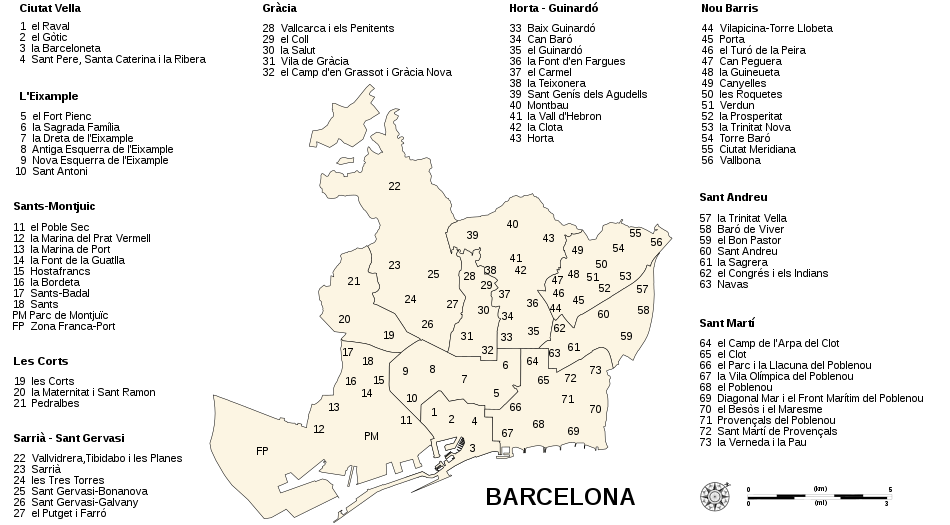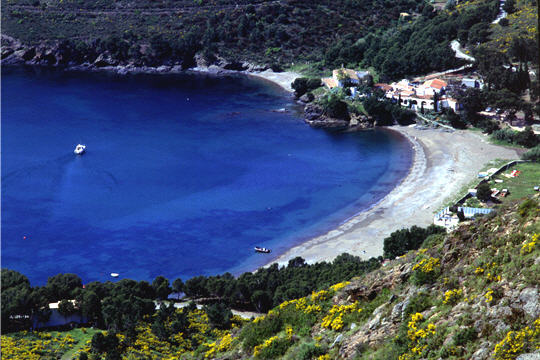 |
| Les Rambles are amazing |
“Where are you from?”
“Barcelona”
“Oh, I love Barcelona!”
“Have you been there?”
“Yes! I loved Les Rambles!”
I’ve had this conversation with around 100 people in my whole life, and I’m sure I will have it many more. Every time I have it, between 32 and 2975 of my brain cells die.
 |
| There's a lot to do in Barcelona in August |
As a child and as a teenager I was not aware of the fact that I was from Barcelona. I went through a phase of hating the city (and I don’t mean the way all Barcelonians feel in August when there’s absolutely nothing to do there, I mean really hating Barcelona: I didn’t find any beauty in so many buildings and so much pollution). And then, after I lived away for a while and went back, I started loving Barcelona. And that love has kept growing deeper and deeper. So when people tell me they “loved Les Rambles”, they don’t understand why I want to punch them in the face straight away. The reason is because I know Barcelona, it’s mine… just as it also belongs to every other person who lives in Barcelona. We all have our own personal Barcelona.
I read an article some time ago in traveler.es called “46 things you’ll only understand if you’re from Barcelona”. It’s one of those articles with a list of funny things that I usually disagree with. I was surprised, though, that I agreed with most of the points in the list, and I actually found it hilarious. So in this post I’m going to explain some of those points (I’ve reduced it to 10) and add my opinion. If you are thinking of visiting Barcelona, this may help you understand a few more things about the city and the locals.
1. The right way of saying “bye” is “adéu”.
Forget about “adiós”, that may work in the rest of Spain (maybe not the Basque Country), but definitely not in Catalonia or its capital city, Barcelona. It doesn’t matter if you’re originally from Madrid, Sevilla, Moscow or Tokyo, if you live in Barcelona, you say “adéu”. Actually, we don’t even pronounce the “a”, we say “déu”.
2. We love complaining about tourists.
Absolutely true. We don’t go where they are: Les Rambles, the Sagrada Familia (like most Barcelonians, I’ve never been inside. The ticket is 16€ for goodness sake!!!), or the Park Güell (I have the card that allows me to access the park for free… and I’ve never used it). It's not the tourists' fault, we know, it's actually the government's who has found a goldmine there and doesn't have any control over the hordes of tourists that invade Barcelona every day. If you are really interested in knowing more about this problem, there's an incredibly fantastic documentary called "BYE BYE BARCELONA" which explains this in more detail.
3. Walking down Les Rambles is a nightmare.
Poor tourists, they think the restaurants there serve decent food at reasonable prices. WRONG. And then they all get drunk in a second and the Rambles are full of drunk tourists vomiting everywhere and trying to find more bars where to drink more: they may go down the Rambles and end up in the port, or up the Rambles and then they invade the George Payne (a really cool Irish pub… or at least, that’s what it used to be) in Plaça Urquinaona. A tourist from New Jersey once started shouting at me there, she was drunk and I thought she was going to kill me. Then she hugged me and wanted to be my best friend. Tourists.
4. It’s easy to find your way.
Barcelona is like a square: the sea on one side, the mountains in the other, and rivers in the other two, the Besos and the Llobregat. As long as you know that, you know how to give directions and to find your way. If you don’t is because you’re not from Barcelona or you don’t have Google Maps.
5. Each neighbourhood used to be a town in the past.
 |
| These are all the districts and neighbourhoods of Barcelona |
Sants, Sarrià, Gràcia and all the others… each one is different. Different architecture, different history, the people living in them are different as well. Each neighbourhood has its own festival that usually lasts a week, with free concerts, competitions and activities for everyone. The best festival is supposed to be the one in Gràcia (around the 15th of August) but I’m probably saying so because I’m from Gràcia.
6. Of course there are beaches in Barcelona, but we don’t go there.
6. Of course there are beaches in Barcelona, but we don’t go there.
 |
| Cala Montjoi (rocky coves in the north) |
If we want to go to the beach, we go to the north or to the south, it depends on what kind of beach we like going to. The beaches in Barcelona are dirty, so we leave them to the tourists and their shadows: the thieves.
7. Barcelona is VERY humid.
 |
| Castelldefels (long sandy beaches in the south) |
7. Barcelona is VERY humid.
Cold feels colder and heat feels hotter because of humidity. You feel your bones wet in the winter, and in the summer… you can’t sleep. We don’t like our weather, but we feel sorry for yours anyway.
8. Food and mealtimes are SACRED.
8. Food and mealtimes are SACRED.
 |
| Shut your mouth and eat your food! |
We don’t skip meals and each meal must have at least 2 courses. Lunchtime can last from 2pm to 5pm in the weekends. Dinner never happens before 9pm. Don’t be surprised at this if your dinner time is at 6 or 7pm, confess it: you are hungry again by 11pm. By the way, tapas is not a type of food, is a way of serving food. And it’s more of a way of socializing than eating. If you understand the concept of “pub-crawling”, then you understand the concept of “tapear”, it’s exactly the same but sharing food with your mates in tiny dishes. Do you know when you are in a pub and you ask the waiter to bring some peanuts? Well, that’s a tapa. Mindblowing, eh?
9. We don’t drink or take coffee, we “do” coffee.
When we want to meet up with a friend at any time before dinner, we use the expression “meet up to do a coffee”. It doesn’t matter if it’s in a café or at my/his/her house. In fact, it doesn’t matter if you really have a coffee or not.
10. We like to think we made everything first, and that what we do becomes trendy.
People in Barcelona have a sense of fashion not according to any trend but to each individual. It doesn’t really matter what you wear, as long as you do it in the right place. Each type of personality has its place in Barcelona. If you’re a goth, your street is Tallers (especially since they shut the Valhalla, a bar for rockers). If you are a skater, go to the MACBA. If your style is steampunk or Victorian goth, you’ll find a lot of people like you in Arc de Triomf, though you may also find other kinds of geeks and nerds there because the Gigamesh bookstore and the Norma Comics store are there. Bohemians and artists are in Gràcia. Hipsters go to Sant Antoni, to all these new bars and restaurants where they serve homemade beer and vermouth. Posh people are found in Bonanova and Sarrià, and chavs in El Carmel or racing with their cars in La Rabassada. The list is neverending.
I could go on and on talking about Barcelona but I’ll leave it here. If you are from Barcelona and want to add anything, feel free to post a comment. If you are not from Barcelona but you’ve been there, you’re comments are very welcome too. And if you aren’t from and haven’t been to Barcelona and want to ask or say anything, go ahead.
(All the gifs used in this post are taken from the tumblr account "When you live in Barcelona", run by a British person who has lived in Barcelona for years. Really worth having a look.)




